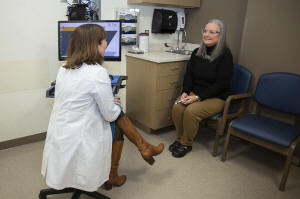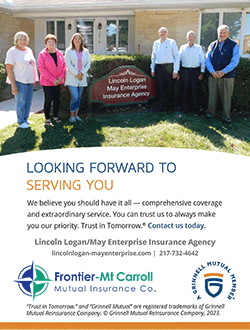West Virginia patients are left in limbo over changing insurance
coverage of obesity medications
 Send a link to a friend
Send a link to a friend
 [January 03, 2025]
By LEAH WILLINGHAM [January 03, 2025]
By LEAH WILLINGHAM
CHARLESTON, W.Va. (AP) — Lory Osborn says the Wegovy she was prescribed
15 months ago did more than help her lose 75 pounds — over a quarter of
her body weight. The administrative assistant at West Virginia
University said she feels healthier at 62 than she has since graduating
high school.
But lately, she's been having panic attacks because she fears running
out of medication. Citing a gross cost of $1.4 million a month, West
Virginia abruptly announced in March it would indefinitely pause a pilot
program covering weight loss drugs for 1,000 public employees, leaving
patients like her scrambling. West Virginia’s Public Employee Insurance
Agency (PEIA) will continue covering the popular and expensive GLP-1
drugs to treat Type 2 diabetes.
Other state and private insurers have adopted similar stances for the
drugs, which can cost patients more than $1,000 monthly out-of-pocket.
In 2024, Blue Cross Blue Shield of Michigan, the state’s largest
nonprofit insurer, and North Carolina's state employee public insurance
agency stopped covering the drugs for weight loss, saying the cost
increased premiums for all customers.
The dilemma comes amid a similar debate at the federal level. President
Joe Biden unveiled a plan in November to cover the drugs for millions of
weight loss patients on Medicaid and Medicare, though the measure could
face opposition from President-elect Donald Trump's administration.
Robert F. Kennedy Jr., Trump's nominee for Health and Human Services
Secretary, has criticized Ozempic — a GLP-1 used to treat diabetes.

Proponents say long-term savings could outweigh the cost — especially in
West Virginia, which has the nation's highest rates of obesity and
diabetes. Obesity increases their risk for conditions such as heart
disease, cancer and high blood pressure. About half of West Virginians
rely on Medicare or Medicaid for insurance.
Osborn said it makes no sense for West Virginia to invest the money in
the pilot only for patients to come off it and lose their progress.
Osborn usually takes her injections once weekly, but said she started
waiting 10 or 12 days to make her final three-month supply last.
“It is so cruel,” said Osborn, who took her last PEIA-covered dose of
Wegovy weeks ago. “We are suffering mentally just from the thought of
going back.”
West Virginia’s residents are among the poorest in the U.S. and the
state is home to rural food deserts where it can be hard to find any
grocery stores, never mind finding one with a variety of nutritional
food options.
Outgoing West Virginia Gov. Jim Justice — who has lost between 30 and 50
pounds while taking Ozempic — said after Biden's announcement that he
would “be a proponent of trying to do everything we can to be able to
expand these drugs to everybody."
"There’s a real argument that at the end of the day, we end up saving
that money," said Justice, who was elected to the U.S. Senate in
November. About 25% of Americans have a health insurance plan that
covers these weight loss drugs, according to the AXIACI Obesity Coverage
Nexus, a database produced by the Leverage consulting firm.
The vast majority of coverage of the drugs is provided by government
health plans, largely state Medicaid plans, according to Leverage. All
state Medicaid programs cover the drugs for Type 2 diabetes, but only 14
provide some form of coverage to treat obesity. Medicare plans cover the
drugs for weight loss if they are prescribed to a person at risk for
stroke or heart disease.
Dr. Laura Davisson, medical weight management director at West Virginia
University, said losing coverage for medications is a “nightmare” for
patients. This year, Davisson’s office saw over 1,000 GLP-1 patients —
many of whom have made extra appointments or joined support groups with
her staff to discuss options when they learned of the coverage changes.
“We’re the state with the number one rate of obesity, and I’ve just lost
all access to my most powerful tool for treating obesity medically with
almost every one of my payers,” she said. “How does that make sense?”
[to top of second column]
|

Patient Lory Osborn (right) speaks with Dr. Laura Davisson, director
of the Medical Weight Management at West Virginia University in
Morgantown, W.Va., Monday, Dec. 2, 2024. (AP Photo/Kathleen Batten)
 The length of time she sees patients
take the drugs varies, but some may have to take it indefinitely to
suppress food cravings. She said the state employee pilot program
took a responsible approach by requiring that patients be prescribed
the medications through obesity specialists, giving them counseling
on diet, exercise and side effect management.
“They already invested millions of dollars in these people," she
said. “It’s financially wasteful to throw it away, have these people
regain their weight, get their health problems back, and we don’t
actually get to see the full potential of this pilot project."
Dr. Bisher Mustafa of the Marshall Health Obesity Clinic in
Huntington said there's a certain irony to waiting "until people
have diabetes to start the medication.”
“The idea is to try to prevent diabetes from happening from the
beginning,” he said.
PEIA Director Brian Cunningham said GLP-1s, which the state began
offering for weight loss in 2019, cost the program around $53
million last fiscal year — about 20% of what PEIA spends on drugs.
The cost of the GLP-1s was cited as a reason for 14% premium hikes
for state employees, as well as a 16% increase for county employees
and a 12% bump in costs for retirees. Increases will go into effect
in July, according to the insurance agency, which covers 150,000
government workers, 56,000 retirees and their dependents.
That's frustrated some PEIA members who feel they are unfairly
shouldering the cost burden for a medication they don't use. Ashley
Peggs, a Kanawha County teacher who doesn't use GLP-1 drugs, said
her heart sank when she saw how much the plan was spending on the
medicines during a public hearing about the proposed premium
increases.
She said the agency had just denied coverage for a spinal procedure
for a condition threatening her ability to walk.
"So somebody else being skinny is more important than the fact that
I literally may not be able to continue teaching until I retire
without a wheelchair?" said Peggs, 35, at the public hearing.
Some taking the drugs for diabetes — like the vast majority of state
employees on GLP-1s — expressed frustration that they haven't even
been able to access Ozempic consistently because of shortages.

“What’s going to be cheaper: pay for that medication or for me to
lose a leg to gangrene like my grandmother did?” said Michael
Kimball, 42, who takes the drug for diabetes. “Year after year, the
burden is put on the back of the working man and we’re getting a
little tired of it."
Osborn described Wegovy as a breakthrough recommended by her
provider after she'd tried for years to lose weight any way she
could. She's also been able to halve the amount of rheumatoid
arthritis medication she takes and she's seen back pain and her
sciatica almost eradicated.
She said dropping coverage for obesity patients feels like
“weight-based discrimination” because other chronic diseases
qualify. Osborn said she'll try purchasing versions of the
medications that aren't approved by the FDA through compounding
pharmacies. Doing so will increase her cost to around $300 per
month. PEIA had provided her with a three-month supply for $50.
“I think that they need to realize that obesity is a disease — it's
not a willpower, gutting-it-out choice," she said. "It is a disease
that you suffer from just like any other disease that you cannot
prevent.”
All contents © copyright 2024 Associated Press. All rights reserved |